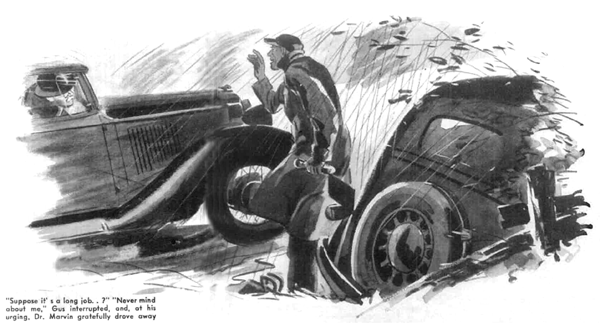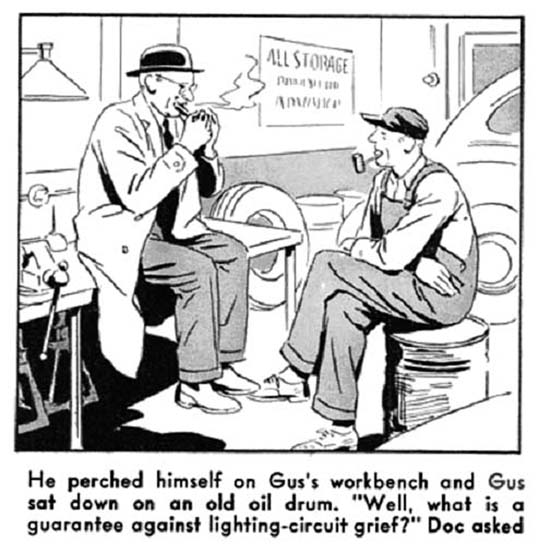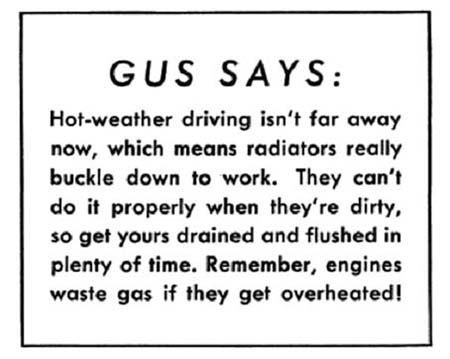May 1942
GUS SPOTLIGHTS LIGHTING TROUBLES
by Martin Bunn
Get the Model Garage boss
and his friend Doc Marvin together for a few minutes
and
they'll be able to talk on any topic - so long
as it's automobiles!

Gus Wilson was in his Model Garage shop a little after ten o'clock one rainy early spring evening when he heard the other telephone ring. Knowing that his partner Joe Clark was in there working overtime on his month-end bookkeeping, he went on with what he was doing. But after a half minute Joe stuck his bespectacled face in at the door that leads from the shop to the office.
"Doc Marvin's on the wire," he said. "He's calling from Brady's place, out there on the back road, and he says that his car lights have blacked out on him and he can't get them burning again. He's on a rush call, and he wants to know if there's anything you can do to help him out."
Gus knows Dr. Marvin well enough to be sure that when the doc gets in automotive trouble he does his darnedest to get himself out of it before he sends out an S.O.S. "Tell him I'm on my way," he instructed Joe briefly. Then he got together a few tools, a flashlight, and a half dozen new lamp bulbs, put them in his old roadster that runs like a 1942 car, got in himself, and was out of the shop almost as soon as Joe had hung up the receiver.
Brady's place is a roadhouse three or four miles out of town, and Gus didn't waste any time getting there. Doc Marvin was on the porch waiting for him, and hurried out through the pouring rain when he stopped. "My bus is a couple of hundred yards along that side road that leads off to the right," he said as he got in. "Watch the road -- it's terrible."
The road was terrible -- one of those rutted-mud lanes that you're always surprised to find anywhere close to a big city. "Where were you headed for when you ran into grief?" Gus inquired as the roadster bumped along.
"There's a kid sick on a little truck farm a couple of miles out from here," Dr. Marvin told him. "Its father came in to Brady's to phone me, and then hurried back home. He didn't speak very good English and he was scared, so I couldn't make out what's the matter with the kid. But it sounded as if it might be serious, so I started right away. I was going along at a pretty fair clip when I hit an extra bad bump, and my lights went out. I put in my spare bulbs and started off again, but when I hit the next bad bump, off the lights went again. I figured that in the long run it would save time if I could get you to come out here and give me a hand . . . There's my car."
Gus stopped. He picked up his flashlight, tools, and bulbs and got out of his roadster. "Use my car to make your call, Doc," he said. "If I can get your lights burning I'll drive your bus in to the shop, and you can get it there tomorrow morning. If I can't get them burning, you can pick me up here on your way back to town. O.K.?"
"That's very good of you," Dr. Marvin said. "But suppose I run into a long job . . . ?"
"Never mind about me," Gus interrupted, and, at his urging, Dr. Marvin gratefully drove away.
Gus went over to the doctor's car and examined his head and tail-light connections as well as he was able to in the driving rain, found them in apparent good condition, and put in new bulbs. Then he got into the car, and pulled the light switch. The lights flashed on.
"The new bulbs that Doc put in burned all right, too," he thought. "But maybe these will last long enough for me to make it back to the shop, where I can really work. Might as well try, anyhow."
He switched on the engine, and easing the car over the many rough spots, drove carefully down the road. The headlights burned brightly -- until one of the front wheels thudded down into a deep hole he hadn't seen because it was filled with muddy water. Then the lights blacked out again.
Gus cussed. Then he checked over the wiring and connections inside the car. They looked all right. He uncovered the battery and examined the cables and terminals. They seemed in good condition. So he again put in new bulbs, got back into the car, and pulled the light switch. Again the lights burned brightly.
He switched them off and sat in the dark as he did some hard thinking. "The first bump I hit," he told himself, "they'll go out again. Why? What makes electric bulbs burn out? Too high a voltage, nearly always. But Doc's been driving this old sedan of his a lot even since he bought that new one, and I've never heard of him having any lighting circuit trouble before. Too high voltage would have to come from the generator, and -- I am dumb! That must be it."
He ducked under the dash and flashed his light on the back of the ammeter. The battery lead was loose on its ammeter terminal. He grinned widely as he tightened the nut. Then he switched on the lights, started the engine, and bumped confidently off along the road.
Gus hadn't been back in the shop more than half an hour when Dr. Marvin drove in. "I see you got 'em to burn," he said, glancing at his sedan.
"That was easy," Gus told him. "How's the kid out there on the farm, Doc?"
The doctor laughed. "That was just another of those false alarms that usually come on rainy nights -- the combination of common bellyache and a pair of first-time parents," he said. "What was the matter with my lights, Gus?"
"That was a case of too much juice," Gus replied. "You have a 6-volt battery and a 6-volt lighting circuit. But your generator generates more than that, so that it can force the current into your battery. The battery lead was loose on the ammeter terminal, so when you hit a real bad bump in the road the lead jarred away from the terminal. That sent the higher voltage of the generator through the lighting circuit, and of course it burned out your bulbs. When you stopped your car the loose lead settled down and made a connection again. All I had to do was tighten the nut on the terminal. Your bus is all ready for driving now."
Dr. Marvin said what he'd be. When he cooled off, he perched himself on the end of Gus's workbench and lighted a cigar. Gus up-ended an old oil-drum, sat down on it, and fired up his pipe. The drumming of the rain on the shop roof drowned out the clatter of Joe Clark's typewriter in the office, and everything was set for a comfortable fanning session.
"Well, what is a guarantee against lighting-circuit grief?" the doctor asked.
"A guarantee against it? Well, I'd say that the best guarantee against it is having your lighting circuit checked often by an expert. When a car is new, you can pretty well take it for granted that it's O.K. But as soon as you start to drive that new car, its lighting system will start to wear out -- same as every other part of the car. That's why every car should be checked frequently -- to catch the little things that go bad from wear, and to fix 'em before they get bad enough to make trouble.
"Of course, the headlights are the most important part of your lighting system. When everything in the system is just the way it should be they produce the equivalent of 50,000 candlepower -- and that's plenty of light for safe driving under any normal conditions. But for them to produce that much light every part of your system must be right. Your bulbs must be good, your reflectors bright, all your terminals both bright and tight, and your switches and your cables in good condition.
"A noticeable flare-up of your headlights is a warning of trouble on the way. It almost always means that your lighting circuit is carrying too high voltage. Sometimes a sudden increase in voltage will burn out your lamps and leave you stalled on a dark road -- that's what happened to you tonight. But more often too high voltage just shortens the life of your lamps. That isn't so serious, but it takes good money out of your pocket. The bulbs used in head lights are designed to operate on voltage which varies -- so long as it doesn't vary too much. A 6-volt lamp working in a 6-volt circuit usually has a life of somewhere between 115 and 130 hours. But the same 6-volt lamp working in a 7-volt circuit may not last more than 30 hours!
"So take my advice, Doc -- if you notice your headlights flaring up when you speed up your engine, give your lighting circuit a careful checking. Loose or dirty connections are the most usual cause of the trouble -- they make the generator voltages build up. You may find them at the ammeter -- the cause of your grief tonight -- or somewhere else between the generator, the ammeter, and the battery. Remember that good connection means metal-to-metal contact over the full area of the wire which carries the juice, and that either corrosion or dirt will prevent that sort of contact."
"Right," Dr. Marvin said. "I'll keep an eye peeled for headlight flare-ups. But how about too low voltage?"
"If your headlights seem to be growing dim," Gus said, "trust your eyes and do some checking for low voltage. It's worth finding and correcting. A 10-percent loss in voltage means a 30-percent loss in candlepower.
"The cause of low voltage isn't as easy to locate as the cause of too high voltage because low voltage has more possible causes. I always start by checking the battery -- very low water in the battery can cause battery-voltage drop under the load of the headlight bulbs. Then I check for badly corroded battery cables, and then for poor ground connections. Next I close the lighting switches, and check across them for voltage drop. If I find any drop, I examine the wiring carefully, and give special attention to connections. If I find a connection made by just twisting the strands of a wire around a screw and then fastening them I'm pretty certain that I've found the cause of the trouble. When a wire is terminated that sloppy way, corrosion will get in its dirty work before very long and cause voltage drop. Such sloppy connections should be replaced by a soldering lug -- or at the very least the end of the wire should be dipped in solder before it is twisted around the screw."
"If I'd been driving my new car with the sealed-beam headlights, I wouldn't have had this trouble tonight," Dr. Marvin said.
"Maybe not," Gus agreed, "and then maybe so. It was just one of those things . . . "
Suddenly all the lights in the shop went out.
"What's this?" Dr. Marvin demanded. "A blackout?"
"Looks like it," Gus said. "The second one tonight for us."
The lights flashed on again. Joe Clark was standing in the office door, grinning at them. "It's after twelve o'clock," he announced. "Don't you two fellows ever want to get any sleep? When you two get to talking about automobiles, one of you is as bad as the other!"
END
L. Osbone 2019

